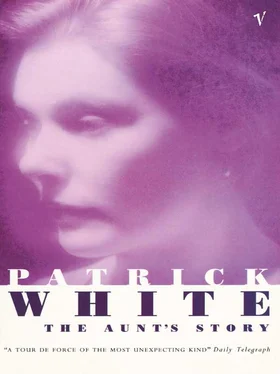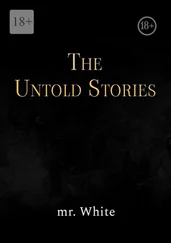Only some way farther on Huntly turned to Theodora and said, ‘You realize we forgot to collect your prize?’
She looked at him and regretted his smile. It was like the last smile of someone on a railway platform, to whom one should have spoken while there was still time.
‘Yes,’ she said, ‘I realized.’
So they walked on, and later in the evening they went out of the gates.
‘Did you enjoy yourself?’ asked Mrs Goodman, half in fear.
‘Yes,’ said Theodora. ‘I had a mild success at a shooting range.’
Mrs Goodman turned her face, as if she were hiding a scar, and her breath some quick stab. She hated her daughter painfully. She hated her feet, which had always seemed to move over the earth without touching, and the ridiculous rifle she had carried, which still blackened her brown hands.
‘In front of all those people?’ Mrs Goodman said.
‘Why ever not? They applauded me,’ said Theodora dryly. ‘I won a kewpie in a feather skirt.’
Mrs Goodman stared at one of her rings that she had never seen before.
‘You must have looked a sight,’ said Mrs Goodman, ‘carrying a vulgar doll through the crowd.’
In her hate she would have hewn down this great wooden idol with the grotesque doll in its arms.
‘I spared your sensibility,’ Theodora said. ‘I did not take my prize.’
‘I cannot believe that I played even an indirect part in the incident,’ said Mrs Goodman.
‘Mother, must you destroy?’
‘Destroy?’ asked Mrs Goodman.
‘Yes,’ said Theodora. ‘I believe you were born with an axe in your hand.’
‘I do not understand what you mean. Axes? I have sat here all the afternoon. I am suffering from heartburn.’
At night Theodora Goodman would bring her mother cups of hot milk, which she drank with little soft complaining noises, and the milk skin hung from her lower lip. She was old and soft. Then it is I, said Theodora, I have a core of evil in me that is altogether hateful. But she could not overcome her repugnance for the skin that swung from her mother’s lip, giving her the appearance of an old white goat.
Mrs Goodman rumbled and sighed. ‘Give me my slippers. Give me my glasses, Theodora. It is time I took my drops. It is cold. It is hot. I am an old woman, and nobody understands the tragedy of age, unless they have experienced it themselves. You, Theodora, will experience a double hell, because you have rejected life.’
‘Go to sleep, Mother,’ Theodora would say.
‘Sleep! How can I sleep?’
Horses clattered through the grey light.
‘Why won’t you take him?’ Mrs Goodman said.
‘Why must I take, take? It is not possible to possess things with one’s hands.’
‘I remember the other evening he rode across the bridge. Well,’ said Mrs Goodman, ‘Fanny has been happy. It was different when one waited for the sound of horses’ feet.’
Horses clattered through the grey world that was Mrs Goodman’s sleep, and the morning when Theodora, for some inexorable reason, had got up and gone to look at her mother. Theodora breathed low. Her hair hung over her mother’s bed, just not sweeping the face. Neither the softening of sleep nor the callous demolition of age could conceal Mrs Goodman’s hatefulness. If there had been only the old soft body, Theodora could have pitied, as if it had been some discarded object in white kid. But she did not pity. At times she could still love, because her mother sat at the end of the passage of roselight, upright on her scroll-back sofa, reading from mahogany lips the little hard poems of Hérédia, which she let fall like pebbles from the past, and the roselight closed and opened. Faces swam at Mrs Goodman’s will, the drowning faces of the lost or dead, Father, and Gertie Stepper, and the Syrian, and Pearl Brawne. You see all these faces that I command, said Mother, it is they who give me my significance, they are why I can smile, and you will answer it with love.
It was like this, to Theodora, watching her mother’s face in the grey light of morning, through which cold hoofs clattered, and the milkman’s bucket. But she could also hate. Love and hate, felt Theodora, are alternate breaths falling from the same breast. And now her own breath was choking and knotting inside her.
If I were to open my mouth, she said, as wide as it will go, and scream from the bottom of my stomach to the top of my voice. Aaahhhhhhhhhhh!
But she did not do it. She trembled for the idea.
She began to walk about the house to avoid her thoughts, but it is not possible to avoid thought, it will not be cut.
She went into the kitchen. Outside there was a wind sawing and rasping, a thin gritty wind of morning, blowing off concrete and damp brick. The light was so thin in the kitchen that it was not quite moonlight, not quite morning. It glittered on the zinc. The skins of the onion rustled.
Theodora took up the thin knife, very thin and impervious, from where it lay in the zinc light. Now she remembered most distinctly the last counsel Jack Frost had held with the meat-knife in the kitchen. She remembered him standing by the dresser. She could see the black hairs on his wrist as he weighed the pros instead of biscuits.
But this, she trembled, does not cut the knot. She threw back the thin knife, which fell and clattered on the zinc, where it had been put originally to be washed. There was the cup too, which the knife nosed, the empty cup which Mrs Goodman held to her chin and its trembling beard of white skin.
It has been close, felt Theodora, I have put out my hand and almost touched death. She could see its eyelashes, pale as a goat’s, and the tongue clapping like a bell.
Bells rang across the bay for morning. Theodora Goodman went upstairs. She paused on the landing, halted by the wave of her mother’s unarrested sleep. Light slashed the face of Theodora Goodman to the bone. I am guilty of a murder that has not been done, she said, it is the same thing, blood is only an accompaniment. She went on to her own room, away from the act she had not committed, while her mother continued to sleep.
‘Theodora, you look as if you have seen a murder,’ said Mrs Goodman when she woke.
‘I did not sleep, Mother. I shall take an aspirin.’
‘Ah, where would we be without aspirin!’ Mrs Goodman said.
When we have drained the last emotional drops from a relationship, we contemplate the cup, which is all that is left, and the shape of that is dubious. So neither Mrs Goodman nor Huntly Clarkson had survived in more than shape.
‘I seldom see you now, Theodora,’ Huntly said.
‘If I had anything further to give you, then you would see me,’ said Theodora. ‘But we have both survived a phase.’
‘Surely you are making your necessity mine?’
By this time he was able to laugh.
‘Let us call the necessity a common one,’ she said.
Though her defence of it was firm, and even brutal, she had not yet discovered what this necessity was. Her days were endless. But at least I am an aunt, said Theodora, when her hands trembled in the grey light, waiting for bells. It had both a close and a distant sound like the letter from Lou:
Dear Aunt Theo,
I wish you were here. Blossom had a calf among the buttercups, I saw her lick it with her blue tongue. The calf is mine, and the boys have theirs. If you would like a calf and will come, I would like to give you mine. I have called her Plum. George got a boil. They put on bread poultices and it made him scream. I hope that I never get a boil. I draw a lot. I will send the pictures that I drew to you and Grannie Goodman when I have got tired of them. I have drawn a house where seven children live. I have drawn a yellow thunderstorm. When you come I will play you my piece, it is the Snow Queen, I am not very good, and Mummy says the piano is not for me. Sometimes I get my nuckles rapped, and it hurts when there is frost. Frank has learnt to make some new faces. They are awfully funny. He will make them when you come. See then what a lot you will get, I shall be surprised if you do not find it tempting.
Читать дальше












